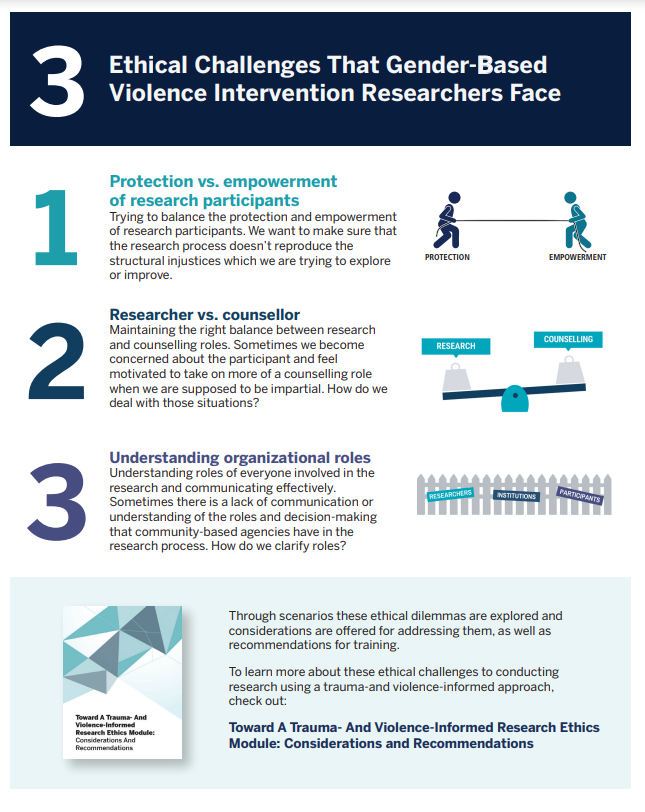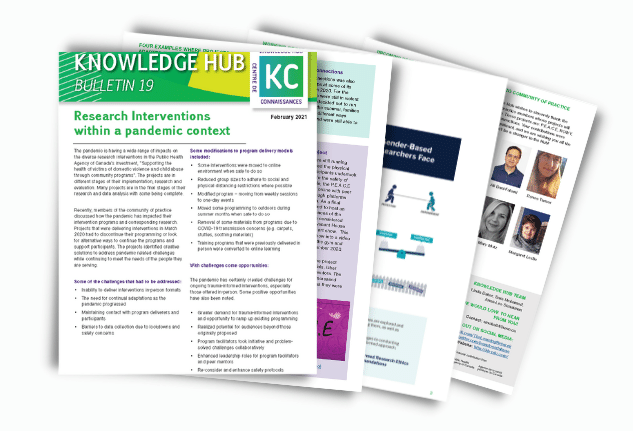Bulletin 19 - February 2021
Research Interventions within a pandemic context
The pandemic is having a wide range of impacts on the diverse research interventions in the Public Health Agency of Canada’s investment, “Supporting the health of victims of domestic violence and child abuse through community programs”. The projects are in different stages of their implementation, research and evaluation. Many projects are in the final stages of their research and data analysis with some being complete.
Recently, members of the community of practice discussed how the pandemic has impacted their intervention programs and corresponding research. Projects that were delivering interventions in March 2020 had to discontinue their programming or look for alternative ways to continue the programs and support participants. The projects identified creative solutions to address pandemic related challenges while continuing to meet the needs of the people they are serving.
Some of the challenges that had to be addressed:
- Inability to deliver interventions in-person formats
- The need for continual adaptations as the pandemic progressed
- Maintaining contact with program deliverers and participants
- Barriers to data collection due to lockdowns and safety concerns.
Some modifications to program delivery models included:
- Reduced group sizes to adhere to social and physical distancing restrictions where possible
- Modified program – moving from weekly sessions to one-day events
- Moved some programming to outdoors during summer months when safe to do so
- Removal of some materials from programs due to COVID-19 transmission concerns (e.g. carpets, stuffies, soothing materials)
- Training programs that were previously delivered in person were converted to online learning
- Some interventions were moved to online when safe to do so
With challenges come opportunities
The pandemic has certainly created challenges for ongoing trauma-informed interventions, especially those offered in-person. Some positive opportunities have also been noted.
- Greater demand for trauma-informed interventions and opportunity to ramp up existing programming
- Realized potential for audiences beyond those originally proposed
- Program facilitators took initiative and problem-solved challenges collaboratively
- Enhanced leadership roles for program facilitators and peer mentors
- Re-consider and enhance safety protocols
FOUR EXAMPLES WHERE PROJECTS HAVE ADAPTED TO THE SITUATION
MindUP for Young Children
MindUP is implemented in London District Catholic School Board (LDCSB) in select kindergarten classes. Teachers that are implementing the program in their schools are having weekly chat sessions where they discuss how they are creatively adapting the program from a classroom-based to an online one. Many have shared that they are sharing mindfulness-based clips with the children. The school board is opening MindUP to any educator interested in implementing the program to help address the continued stressors and uncertainties resulting from the pandemic. The in-person trauma-informed safe schools training is also now offered to educators online instead of in-person. Researchers are now evaluating the differences between training conducted online vs in-person. MindUP was evaluated and the results of the study suggests that mindfulness based SEL intervention can improve psychosocial and behavioral outcomes in young children. Click here to learn more about the study. Impact of MindUP Among Young Children: Improvements in Behavioral Problems, Adaptive Skills, and Executive Functioning | SpringerLink
Building Internal Resilience through Horses
Building Internal Resilience through Horses is another project that was still running its final groups in March 2020. During the Fall, the project was able to offer a one-day version of the program instead of the 10-week program focusing only on the equine portion of it. The project limited the group size to 4 participants and enhanced safety protocols were put in place at the horse farm. Participants appreciated the one-day program and the feedback that the project received was overwhelmingly positive. One participant described the experience as transformational!
Building Connections
Building Connections was also running groups at some of its sites in March 2020. For the safety of participants who were still in violent relationships, the project decided not to run its groups online. During the summer, families were re-engaged in other different ways through outdoor groups and were still able to complete the curriculum.
P.E.A.C.E. Project
Projects that were still running groups or required the physical presence of participants undertook additional measures to ensure the safety of their participants. For example, the P.E.A.C.E project in Toronto connected online with peer mentors and participants through platforms they were already familiar with. As a final activity, the project also decided to host an art show based on the experiences of the participants. At the time, it was considered safe for participants to use Covenant House Toronto’s gym to set-up for the art show. This progressed to turning the art show into a video by recording the art footage at the gym and screening the recording in December 2020. To make the art show happen, the project coordinator mailed out art materials, Uber Eats and taxi vouchers to peer mentors. The art show was an opportunity for increased leadership among peer mentors as they were fully in charge of it. Click here to watch the art show video. The P.E.A.C.E Project (Peer Education and Connection through Empowerment) Art Show - YouTube
WORKING GROUP REPORT
The Knowledge Hub team discussed possible ideas with community of practice members to help promote the working group document, such as infographics and social media posts. Check them out below and please share your ideas with us!

UPCOMING RESEARCH BRIEFING
Exploring lessons learned from arts-based HIV and STI prevention programs with Northern and Indigenous adolescents in the Northwest Territories, Canada
Date & Time: February 18, 2021 1:00 – 1:20 PM EST
Presented by: Carmen Logie, MSW, PhD
We will explore findings on the effectiveness of FOXY and SMASH’s school based interventions, as well as what we learned about social and contextual influences on adolescent mental and sexual health in the Northwest Territories.
Learning Objectives:
- To identify sexual health benefits experienced by participants of an arts-based HIV and STI prevention with Northern and Indigenous adolescents in the NWT.
- To identify contextual factors associated with mental health outcomes, and sexual health outcomes, and identify areas for policy, practice, and research.
FAREWELL TO COMMUNITY OF PRACTICE MEMBERS
The Knowledge Hub wishes to sincerely thank the community of practice members whose projects will be wrapping up. These projects are PEACE, ROWY, and Building Connections. Your contributions were valuable and significant, and we wish you all the best. Don’t be a stranger to the Hub!
- Kasia Ignatowska
- Ali Bani-Fatemi
- Renee Turner
- Hannah Lee
- Mary Motz
- Margaret Leslie

